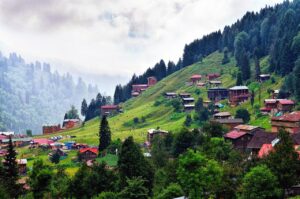Seeking Refuge Among the Enemy?

Imagine being fiercely pursued by your country’s leader, along with some of his best men, and then making false statements to a priest of God to get something to eat. Next, you stretch the truth even more to acquire a sword (which you don’t need in the first place) that belonged to a person of very great stature and might whom you defeated many years earlier with nothing but a stone and a sling. Now, instead of confronting the king, you are fleeing, and, to put an end to this maddening flight, you seek refuge in enemy territory! This really happened to one of the greatest kings of Israel, a man declared by God Himself to be after His own heart. How does a man go from being known among the people as slayer of tens of thousands of their enemies, to having to pretend madness to escape a rival king? Let’s go back in time to see how all of this unfolded.
They didn’t deserve it, but it came about because they sought God and trusted Him to take care of their enemies.
After the Israelites were delivered by God from Egyptian oppression, they went through a refining period of many years in the wilderness. Eventually they crossed over into the land that God had promised them and slowly became a mighty nation. They didn’t deserve it, but it came about because they sought God and trusted Him to take care of their enemies. When most of the surrounding nations saw this, they grew very fearful of them. But this didn’t last, because the Israelites eventually took their eyes off of God and His provision. They no longer wanted Him to reign over them, and insisted on a human king, like the other nations had.
God had actually planned to put a man into place as their leader in the near future. But He reluctantly crowned someone who only pleased the people, not God, due to their obstinance. Here Saul entered the scene. God anointed him as king, knowing he would fail. Saul was greatly received by the Israelites initially. He had all of the elements of a ruler that they desired and proved himself quite satisfactorily overall—for a while.
It wasn’t long before the Philistines practically paralyzed him and his people. They were a powerful enemy, with massive Goliath as their front man. He towered as much as two feet over anyone else across the land. The Israelites very likely had doubts now about Saul, since the whole army was at a standstill. At this point, God brought His “king” into position, when, through a series of events, a lowly shepherd boy named David came forward to challenge and defeat Goliath with only a sling and a stone, in the name of the Lord.
Before long, David was officially anointed king, but Saul remained on the throne. The door was opened to fierce strife.
David was not crowned king at this time. Saul’s greatness and superiority began to go to his head, and his decline as leader of the nation rapidly followed. After he repeatedly disobeyed what God had commanded him, God rejected him as king of His people. Before long, David was officially anointed king, but Saul remained on the throne. The door was opened to fierce strife.
This meant that David was constantly on the run to avoid being killed by Saul. Fleeing and having no stable resting place took their toll on David—physically, emotionally, and spiritually. After his close friendship with Saul’s son, Jonathan, was forced to end, a shift occurred in David’s heart. His thinking became more irrational and his actions displayed it.
David’s first move was to go to the priest in a nearby town. “…David came to Nob, to Ahimelech the priest; and Ahimelech trembled at meeting David, and said to him, Why art thou alone, and no man with thee? And David said…The king has commanded me a business, and has said to me, Let no man know anything of the business whereon I send thee, and what I have commanded thee; and I have directed the young men to such and such a place” (1 Samuel 21:1,2). The priest knew David as captain over a large number of men, and seeing him alone made him frightened and uneasy. But this didn’t faze David, who replied falsely that he was Saul’s special agent. Then David asked to take the holy bread from the priest for himself and his men nearby. Next, he took Goliath’s spear kept in the priest’s possession, the very one David had used to kill him many years earlier, though David really had no need for it (nor did the priest).
David quickly realized that he was actually worse off here than in his own land, trying to escape from King Saul and his men.
Afterward, “David arose, and fled that day from before Saul, and went to Achish the king of Gath” (1 Samuel 21:10). This brings the trek of David’s life full circle, because Gath, the hometown of Goliath, was a city in none other than the land of the Philistines! In his attempt to escape the wrath of Saul, David sought refuge among one of Israel’s main enemies! They were the very ones he had gained victory over for the Israelites when he was young. He did not stay long, because “the servants of Achish said to him, Is not this David the king of the land? did they not sing one to another of him in dances, saying, Saul has smitten his thousands, and David his ten thousands?” (1 Samuel 21:11). David quickly realized that he was actually worse off here than in his own land, trying to escape from King Saul and his men.

So David shrewdly faked insanity before Gath’s king, whom he greatly feared. The king questioned his servants about their absurd actions: “…ye see the man is mad: why did ye bring him to me? have I lack of madmen, that ye have brought this one to rave in my presence? shall this man come into my house?” (1 Samuel 21:14, 15). As a result, David was able to get away safely back to the cave of Adullam in his own land.
When circumstances rise heavily against us, it’s easy to slip and take our focus off of Jesus. But this doesn’t make the results of our actions acceptable before God.
Did David gain anything in the end by doing all of this? Sadly, the answer is no. In spite of his clever efforts, God saw though it all. If David had sought the Lord first before hurrying to flee from Saul, it is very likely that none of this would have happened. David stopped trusting God and trusted himself instead, causing fear to take over. He made bad choices and ended up in the enemy’s territory—trying to be safe!
Are we just as guilty as David at times? When circumstances rise heavily against us, it’s easy to slip and take our focus off of Jesus. But this doesn’t make the results of our actions acceptable before God. David’s rash, selfish, and sinful efforts led him to believe that the Philistine’s camp was a better place to hide, until word got out and he encountered new problems. Let’s not follow David’s example and seek refuge among the enemy to solve the dangers we face. Let’s turn instead to the ultimate haven of rest and source of wisdom—Jesus Christ—rather than deciding on our own.
“I will say of the Lord,He ismyrefugeand my fortress: my God; in Him will I trust.”
Psalm 91:2
[Additional image credits: Featured image (modified) (when applicable) by Dmitry Ratushny on Unsplash; Opening photo by Clker-Free-Vector-Images from Pixabay]




